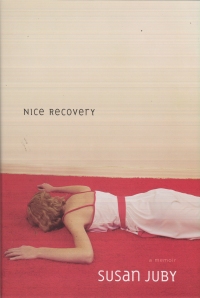| ________________
CM . . .
. Volume XVI Number 40. . . .June 18, 2010
excerpt:
Susan Juby, the successful and humorous author of the popular, “Alice, I Think” series, at only 41 years of age, has written a memoir. The question might be “Why?” and there is a very good answer. Juby’s memoir has to do with her teen years (13-20 years old) and her battle with addiction and recovery (alcohol and drugs). Memoirs are tricky business, and Juby understands this slippery slope, addressing the skeptical reviews an addiction memoir faces, noting “Addicts and alcoholics are notorious fabricators.” In the preface, Juby points out this book is not written to embarrass her family, it is not written with absolute accuracy, and it is not written divulge the names and secrets in other peoples’ lives as it adheres to the principle of anonymity apparent in many 12-step recovery programs. It is a book that she hopes by telling “these stories about addiction and recovery helps one person, it will have been worth it.” Juby’s memoir is written in three parts: Part I, Drinky Pants, Part II, A Quitter’s Story, and Part III, And This is Now. Drinky Pants focuses on what Juby’s adolescence was like and how drinking became a way in which she found she could fit into at least one group at a school she didn’t want to be at in the first place. Juby’s wry sense of humour is still there, but it is never used as a way to make fun of the difficult and often emotionally and mentally crippling circumstances she finds herself in struggling to complete junior high and high school. Picking a group to hang out with was less about popularity and more about blending in, finding a group who had flexible standards and low expectations. It also meant an introduction to the effects of alcohol. Alcohol would play a significant role in Juby’s life all through her secondary school years and on into college. As she reveals the thrills of feeling overconfident when high and the horrors of alcohol poisoning and blackouts, Juby pulls no punches with the raw reality of the consequences of abuse. There are no made-for-TV movie dramatics here; however, there are swear words, physical violence, and relationship dynamics that might disturb younger readers and their parents. Even saying that, please read the book. Part II, A Quitter’s Story, allows Juby to elaborate on what it was like to understand she needed help and what she might have to do about it. Attending an AA meeting is a huge step in an addict’s life, and Juby described herself as “my self-esteem was almost entirely denuded, but I still had a few scrawny branches left.” Stopping drinking left Juby with the “stark awareness of how crappy everything was.” Cleaning up her life meant not only recognizing that alcohol tends to cloud reality over but recognizing and dealing with her own anger over how awful she had let her life become, how awful the people around her were, and how awful it was trying to remain sober. Changing was not easy. Part III, And This is Now, is a part of the book where Juby shares some other peoples’ stories about overcoming addiction (anonymously, of course) to more than just alcohol. These stories offer a window into how one becomes an addict, what addictive chemicals are all about, and how it is possible to break free. She offers an appendix with a 12 step program list, a glossary of recovery-speak, and a bibliography of helpful reference guides. Some people might question why Juby has written this book and if it was necessary to hang her own life out on the limb of the tell-all tree (or at least the share-some branch). However, for those who choose to read her memoir, there are insights to be had, and as she says, “[E]ven if it helps one person, one teenager in the same ugly world of addiction, it’s worth it.” Highly Recommended. Jocelyn A. Dimm is a sessional instructor and a PhD student at the University of Victoria where she teaches drama education and young adult literature in the Faculty of Education.
To comment
on this title or this review, send mail to cm@umanitoba.ca.
Copyright © the Manitoba Library Association. Reproduction for personal
use is permitted only if this copyright notice is maintained. Any
other reproduction is prohibited without permission.
NEXT REVIEW
| TABLE OF CONTENTS FOR THIS ISSUE
- June 18, 2010.
AUTHORS
| TITLES|
MEDIA REVIEWS |
PROFILES |
BACK ISSUES |
SEARCH |
CMARCHIVE |
HOME
|
